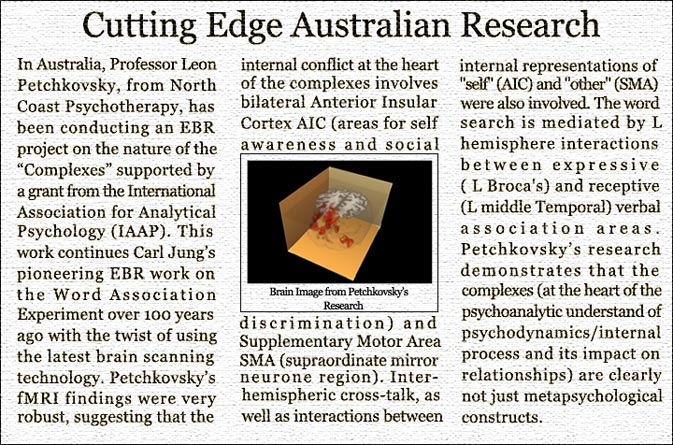Evidenced Based Research or EBR to which it is often abbreviated, is a “current buzz word” for the media and government. Psychotherapy, as a profession, informs itself through walking a fine line between individual and collective clinical experience and statistical and scientific studies. Our approach at North Coast Psychotherapy to our clinical work is “holistic” in nature. This means that we emphasise the importance of the individual nature of each case with an appropriate individually formulated treatment modality. However, this does not mean that EBR is not important in informing our clinical orientations and work. The examples of EBR quoted below investigate the efficacy of Psychoanalysis and Psychoanalytic Psychotherapy (including Jungian) over recent years.
There is a very strong evidence base both for the “construct validity” of the Jungian therapeutic model (fMRI studies) and its effectiveness especially the German Outcome studies (Keller W, Westhoff G, Dilg R, Rohner R, Studt HH 2006). Outcome studies are so strong that in Europe, this kind of psychotherapy is supported by Government funding and Health Insurance Systems. Germany, for instance, recognises Jungian Analytic therapy for Health Insurance benefits.
In a long-term study, Keller and his colleagues investigated the effectiveness of Jungian analysis and the utilization of health insurance benefits. The results speak for themselves:
The objective data from health insurances revealed improvements in the health status and illness behaviour, leading to markedly reduced medical utilization (sick days, hospital days, number of physician visits, drug intake) in the majority of patients even 5 years later and thus to a considerable cost reduction. These results are clinically very important, in view of the long prevalence period of 5 years … this is indicative of the long-term effect of psychoanalysis or long-term psychotherapy.
This research indicated that patients reduced sick days by 66.6% in the year after therapy and was reduced by 50% after 5 years. In terms of hospitalization, hospital days were reduced 87.5% in the year after therapy and 50% after five years. These reductions of sick days or hospital days after long-term psychotherapy is all the more significant when one considers that the cohort of the study was 10 years older at the time of the research and that there was thus an increase in the disease risk and the number of sick days or hospital days.

In general, there is a considerable and growing body of EBR that demonstrates that long term analytic psychotherapy is very effective. This is the case for a broad range of psychological disturbance and is particularly the case for patients with more severe mental dysfunction. The evidence strongly suggests that psychodynamic models (which includes the Jungian analytic modality) are more suited to this patient population. These evidence-based research studies show that analytic psychotherapy treatment outcomes are not only effective but that re-admissions into hospital have decreased, as has lost work time. It could be argued that the shorter term model of the Better Access Initiative of the Federal Government does not provide a setting or time frame for proper mental health care for this patient grouping.
The research also shows that patients continue to improve even after analytic psychotherapy treatment has ended. Milrod et al (2000) established statistically significant and clinically meaningful improvements in panic, depression, anxiety and functional impairment both at treatment termination and at follow-up six months after completion of psychodynamic psychotherapy. Leichsenring and Rabung’s (2008) meta-analysis of the effectiveness of long-term psychodynamic psychotherapy showed it “was significantly superior to shorter-term” treatment modalities and that “long-term psychodynamic psychotherapy yielded large and stable effect sizes in the treatment of patients with personality disorders, multiple mental disorders, and chronic mental disorders”. Bateman and Fonagy (2001) indicated that borderline patients who completed a program of long term psychodynamic psychotherapy not only maintained their substantial gains at the end of treatment but also showed a statistically significant continued improvement on outcome measures.
In an Australian context, Meares and his colleagues have shown a similar outcome with a similar population (Meares, Stevenson & Comerford 1999). His long-term follow up of patients treated intensively using analytic psychotherapy not only revealed positive clinical outcomes but also positive economic outcomes in terms of reduced hospitalisation and use of other services (Stevenson & Meares 1999; Hall, Caleo, Stevenson & Meares 2001). Sandell and his colleagues in Sweden (Sandell R, Lazar A, Grant J, Carlsson J, Schubert J, & Falkenström F) examined more than 400 people before, during and after subsidized long-term psychotherapy as part of the Stockholm Outcome of Psychoanalysis and Psychotherapy Project (STOPPP). They demonstrated that patients in psychoanalysis continued to improve after termination.
These studies strongly suggest that analytic psychotherapy establishes a process that continues after the formal end to the work. This suggests an advantage in longer term, in-depth psychotherapy over short-term modalities.
Click here for a comprehensive bibliography of EBR for Psychoanalysis and Psychoanalytic Psychotherapy
